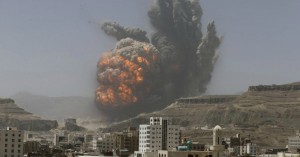
(Photo: Khaled Abdullah/Reuters)
By: Bushra AL-Huthi
As the war in Yemen continues to tear the country apart, the UN envoy to Yemen, Ismail Ould Cheikh Ahmed, set December 15, 2015 as the start date for a new seven-day series of peace talks in Geneva. The talks brought together representatives of the Houthis, the General People’s Congress (GPC – the party of former President Ali Abdullah Saleh), and the Yemeni government. A ceasefire was also proposed prior to the seven-day negotiations. Unfortunately, the ceasefire was suspended when the Yemeni government and the Houthi rebels accused each other of breaking the ceasefire agreement. The Peace talks ended on December 20th with no solution other than a decision to reconvene at some point in January for a third attempt to continue negotiations and reach a peaceful solution to the situation in Yemen.
When peace talks fail, we ought to identify key factors that lead to the failure of these peace talks. In this case, three key factors contributed to the failure of the peace talks. The first of these factors is the absence of a Saudi Arabian representative at the negotiations table. Saudi Arabia is the main supporter of the current Yemeni government and the leader of the coalition currently fighting against Houthi rebels in Yemen. The current Yemeni government has resided and operated from Saudi Arabia, making it evident that many decisions of the Yemeni government are influenced by Saudi Arabia. As a result, the absence of Saudi Arabia at the negotiation table means no concrete solution can be reached and the Yemeni government still has to report back to Saudi Arabia for decisions concerning the ceasefire and potential means to an end of the war. Importantly, as the Yemeni government continues to operate from Saudi Arabia, it indicates fighting on the ground is no longer limited to local actors, but rather a proxy war.
A second factor is the absence of representation from the Yemeni society at large. Civil society representatives must be invited to participate in peace talks to ensure the needs and voices of Yemeni citizens suffering on the ground are heard. Through the participation of civil society, the inordinate impact of war on civilians can be conveyed to the global community and other stakeholders at the peace table. In addition, the lack of any meaningful representation of women was particularly detrimental. Indeed, during Yemen’s National Dialogue Conference women’s groups were especially effective (NDC) in representing economic, political, social, and legal issues affecting Yemeni women. Women proved that they are able to effectively represent the Yemeni society as a whole and have the capacity to play a pivotal role in rebuilding the country.
A third factor is the absence of a real desire by the Yemeni government and Houthis to compromise and reach a consensus on the points reflected in the UN envoy’s proposed agenda. The agenda calls for confidence-building measures, including a humanitarian ceasefire, release of prisoners, facilitating the delivery of humanitarian supplies, and applying UN Resolution 2216, which calls for all sides to end the violence and avoid unilateral actions that jeopardize a political transition. It also demanded that the Houthis withdraw from all areas seized since the conflict began in September 2014.
Houthi rebels and the Yemeni Government showed initial approval on the UN envoy’s proposed agenda for the peace talks but once both parties breached the ceasefire agreement, it soon became evident that they lack the willingness to reach a peaceful political solution. The reason for this is that both the Houthi rebels and the Yemeni Government still hold power on ground, with the only loss being the innocent lives of civilians.
Future peace talks must include representation from coalition countries lead by Saudi Arabia. Saudi Arabia is a supporter of the current Yemeni government and plays a major role on ground. Thus, their presence in these peace talks would be crucial to helping identify a viable solution for an end to the war. In addition to representation from coalition countries, it is important to include international actors, civil society leaders representing different factions of the Yemeni society, and decision-makers from both parties, including women with negotiation skills.
In Yemen’s case, pressure from strong countries such as the US and UK on Saudi Arabia and the Yemeni government may be vital to securing a commitment for a permanent ceasefire agreement and to exploring peaceful political solutions. Furthermore, the Yemeni government and Houthis must present an action plan on how they plan to implement the points proposed by the UN envoy to Yemen. Finally, there must be a full commitment to implement these action plans by current Yemeni president, Abdo Rabo Mansour Hadi, Saudi Arabia, and the Houthis’ leader, Abdulmalik Al-Houthi.
Yemen’s fate remains unclear with no solution insight. The involvement of the international community is necessary at this point, because this unlawful war will only lead to more death, injuries and displacement and will cause the expansion of ISIS and AQAP’s presence in Yemen.

